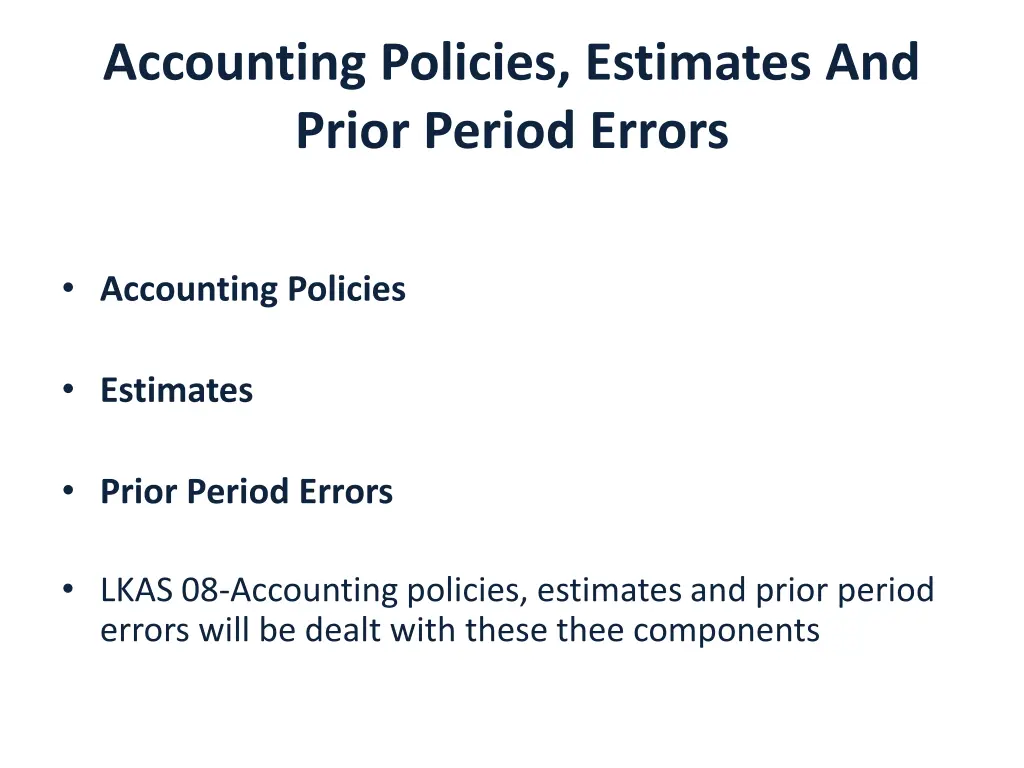
Accounting Policies, Estimates, and Changes in Accounting Methods
Understand the importance of accounting policies, estimates, and changes in accounting methods in financial reporting. Learn about how to select accounting policies, deal with prior period errors, and make changes when necessary. Explore the impact of accounting estimates on asset valuation, liability recognition, and periodic consumption adjustments.
Download Presentation

Please find below an Image/Link to download the presentation.
The content on the website is provided AS IS for your information and personal use only. It may not be sold, licensed, or shared on other websites without obtaining consent from the author. If you encounter any issues during the download, it is possible that the publisher has removed the file from their server.
You are allowed to download the files provided on this website for personal or commercial use, subject to the condition that they are used lawfully. All files are the property of their respective owners.
The content on the website is provided AS IS for your information and personal use only. It may not be sold, licensed, or shared on other websites without obtaining consent from the author.
E N D
Presentation Transcript
Accounting Policies, Estimates And Prior Period Errors Accounting Policies Estimates Prior Period Errors LKAS 08-Accounting policies, estimates and prior period errors will be dealt with these thee components
Accounting Policies Specific principles, bases, conventions, rules and practices applied by an entity in preparing and presenting financial statements
Accounting Policy Selection Accounting Policy Selection When an SLFRS specifically applies to a transaction, other event or condition In the absence of a Standard -the management shall use its judgment in developing and applying an accounting policy policies applied shall be determined by applying the SLFRS relevant to the economic decision making reliable in that the financial statements
Accounting Policy Change Change an accounting policy Required by an SLFRS/LKAS Voluntary change in accounting policy Specific transitional provisions Apply change retrospectively No Yes Apply Specific transitional provisions
Accounting Policy Change A change in accounting policy occurs if there has been a change in: recognition, e.g. an expense is now recognized rather than an asset presentation, e.g. included in cost of sales rather than administrative expenses, or measurement basis, e.g. stating assets at replacement cost rather than historical cost. depreciation is now
Estimates A change in accounting estimate is an adjustment of the carrying amount of an asset or a liability, or the amount of the periodic consumption of an asset Effect of a change in an accounting estimate, shall be recognized prospectively by including it in profit or loss in: the period of the change, if the change affects that period only; or the period of the change and future periods, if the change affects both.
Estimates (Cont.) Valuation of land where it is accounted for at revalued cost Impairment of non-current assets Useful lives of non-current assets Pattern of economic benefits expected to be received from non-current assets for calculating depreciation Impairment of receivables (bad debts) Provision for slow moving and obsolete inventory
Activity Which of the following is a change in accounting policy as opposed to a change in estimation technique? An entity has previously charged interest incurred in connection with the construction current assets to the income statement. Following the revision of LKAS 23, and in accordance with the revised requirements of that s tandard, it now capitalizes this interest. An entity has previously depreciated vehicles using the reducing balance method at 40% pa. line method over a period of five years. An entity has previously shown certain overheads within cost of sal es. It now shows those overheads within administrative expenses. An entity has previously measured inventory at weighted average c ost. It now measures inventory using the first in first out (FIFO) met hod. of tangible non- It now uses the straight-
Prior Period Errors Omissions from, and misstatements in, the entity s financial statements for one or more prior periods arising from a failure to use, or misuse of, reliable information. The effect of rectifying prior period error, shall be recognized retrospectively.
Prior Period Errors (Cont.) an entity shall correct material prior period errors retrospectively in the first set of financial statements authorized for issue after their discovery by: restating the comparative amounts for the prior period(s) presented in which the error occurred; or if the error occurred before the earliest prior period presented, restating the opening balances of assets, liabilities and equity for the earliest prior period presented.
